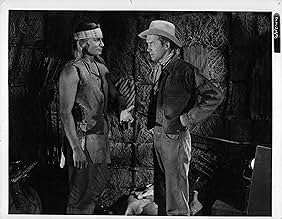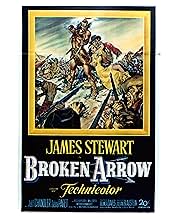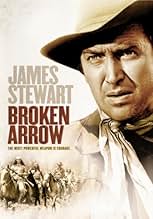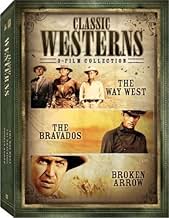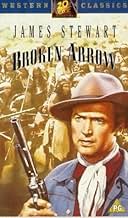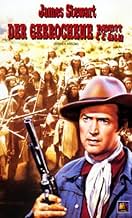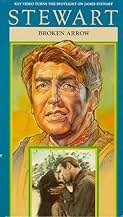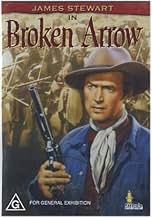VALUTAZIONE IMDb
7,1/10
10.460
LA TUA VALUTAZIONE
Tom Jeffords cerca di fare pace tra coloni e Apache nel territorio dell'Arizona.Tom Jeffords cerca di fare pace tra coloni e Apache nel territorio dell'Arizona.Tom Jeffords cerca di fare pace tra coloni e Apache nel territorio dell'Arizona.
- Regia
- Sceneggiatura
- Star
- Candidato a 3 Oscar
- 4 vittorie e 6 candidature totali
Joyce Mackenzie
- Terry
- (as Joyce MacKenzie)
Robert Adler
- Lonergan - Stage Driver
- (non citato nei titoli originali)
Trevor Bardette
- Stage Passenger
- (non citato nei titoli originali)
Chris Willow Bird
- Nochalo
- (non citato nei titoli originali)
Raymond Bramley
- Col. Bernall
- (non citato nei titoli originali)
Chet Brandenburg
- Miner
- (non citato nei titoli originali)
Argentina Brunetti
- Nalikadeya - Cochise's Wife
- (non citato nei titoli originali)
Harry Carter
- Miner
- (non citato nei titoli originali)
Iron Eyes Cody
- Teese
- (non citato nei titoli originali)
J.W. Cody
- Pionsenay - Chosen Warrior
- (non citato nei titoli originali)
Heinie Conklin
- Townsman
- (non citato nei titoli originali)
Dolores Christine Cypert
- American Indian
- (non citato nei titoli originali)
- …
Recensioni in evidenza
When I was a young boy I saw this picture. It was the first western in which the Indians were not uncivilised barbarians, but normal people, with their own standards. It was a revelation! At last one director had the courage to show this to us. So thank you, Delmer Daves! The performances of Jeff Chandler and James Steward were touching and also Debra Paget was fantastic. I do hope to see this film again someday on DVD. Hans Dullaart Delft Netherlands.
Released in 1950 and directed by Delmer Daves, "Broken Arrow" stars Jimmy Stewart as a former soldier, Tom Jeffords, who saves an Apache teen after ten years of war between settlers and Natives in 1870, Arizona. When the boy's elders extend him mercy Jeffords sees the Apaches as human beings rather than faceless enemies for the first time and becomes the mediator between the warring factions. Jeff Chandler is stunning as the Apache leader, Cochise, but Debra Paget, only 16 years-old during filming, looks too whitebread to be believable. I love Debra, but casting her in this role is eye-rolling. To the film's credit, several of the peripheral Apache characters are played by Native Americans, including Jay Silverheels and John War Eagle.
The emphasis is on the Apache way of life and the movie is touted as the first pro-Indian Western ("pro-Indian" to a point), but this simply isn't the case. "Buffalo Bill" with Joel McCrea came out six years earlier and it was clearly favorable toward the Natives. "Broken Arrow" just goes a little further in this direction. Regardless, it is amazing to view Westerns from this long ago that are evenhanded regarding the Indian Wars, honestly portraying the Natives as hostile and formidable, but also with respect to their perspective and way of life. While obviously dated in some respects, both "Buffalo Bill" and "Broken Arrow" stand the test of time and remain entertaining and even enlightening to this day.
The movie runs 93 minutes and was shot in Arizona, but also Iversion Ranch & Alabama Hills, California.
GRADE: B+ or A-
The emphasis is on the Apache way of life and the movie is touted as the first pro-Indian Western ("pro-Indian" to a point), but this simply isn't the case. "Buffalo Bill" with Joel McCrea came out six years earlier and it was clearly favorable toward the Natives. "Broken Arrow" just goes a little further in this direction. Regardless, it is amazing to view Westerns from this long ago that are evenhanded regarding the Indian Wars, honestly portraying the Natives as hostile and formidable, but also with respect to their perspective and way of life. While obviously dated in some respects, both "Buffalo Bill" and "Broken Arrow" stand the test of time and remain entertaining and even enlightening to this day.
The movie runs 93 minutes and was shot in Arizona, but also Iversion Ranch & Alabama Hills, California.
GRADE: B+ or A-
In this underrated Western, Stewart is an ex-scout who tries to make peace between the Apaches and the white settlers in 1870s Arizona. For some reason this film's reputation has taken a hit over the years, but it is quite enjoyable. Stewart made several Westerns in the 1950s, starting with this and "Winchester 73" in 1950. Although the latter film is more highly regarded today, this film is actually better crafted, boasting fine cinematography and score. Chandler gives perhaps the best performance of his career as the noble Apache chief who is willing to make peace. Paget (looking like Britney Spears!) plays Stewart's love interest.
Delmer Daves offers an important major role to an Indian character, treating him with quality and esteem as human being...
Stewart plays a scout who seeks to heal the divisions between the Apaches and white men But while "Broken Arrow" is a perfectly acceptable depiction of frontier struggles, it does not display Stewart to the best advantages Delmer Daves was competent enough, but he lacked the ultimate virility and intensity of Anthony Mann
"Broken Arrow" examines, rather intensely and directly, the mistreatment and flagrant exploitation of the Indians by whites in the early West
The strength of this often lyrically photographed picture which will a1ways have an honorable place among Westerns lies particularly in the touching dignity of Stewart's love and marriage to an Indian girl (Debra Paget). Indian haters, of course, stir up the usual sort of trouble and Stewart's bride becomes a victim with all the consequent poignancy for which the film is best remembered
The over-wise Chandler counsels him that he must learn to live with his whiteness just as his new friends must contend with their own place in the cosmic scheme of things Cochise has words of stark consolation for Stewart: "As I bear the murder of my people, so you will bear the murder of your wife."
The most interesting aspect of " Broken Arrow" is not the interracial romance between Stewart and Paget, but Stewart's relationship with Chandler's Cochise There is intra-character complexity here, as Chandler struggles to overcome his disturb of all whites, and Stewart attempts to comprehend the different philosophy and cultural of the Indians
Jeff Chandler was quite apt and professional He was so believable in the role of the Apache chief Cochise that he was to essay it again in George Sherman's "The Battle at Apache Pass" in 1952 Chandler's facial bone structure lent itself to noble, incisive Indian profiles, and unlike other Caucasian actors he did not look out of place He was even nominated for Best Supporting Actor at that year's Oscars
Stewart plays a scout who seeks to heal the divisions between the Apaches and white men But while "Broken Arrow" is a perfectly acceptable depiction of frontier struggles, it does not display Stewart to the best advantages Delmer Daves was competent enough, but he lacked the ultimate virility and intensity of Anthony Mann
"Broken Arrow" examines, rather intensely and directly, the mistreatment and flagrant exploitation of the Indians by whites in the early West
The strength of this often lyrically photographed picture which will a1ways have an honorable place among Westerns lies particularly in the touching dignity of Stewart's love and marriage to an Indian girl (Debra Paget). Indian haters, of course, stir up the usual sort of trouble and Stewart's bride becomes a victim with all the consequent poignancy for which the film is best remembered
The over-wise Chandler counsels him that he must learn to live with his whiteness just as his new friends must contend with their own place in the cosmic scheme of things Cochise has words of stark consolation for Stewart: "As I bear the murder of my people, so you will bear the murder of your wife."
The most interesting aspect of " Broken Arrow" is not the interracial romance between Stewart and Paget, but Stewart's relationship with Chandler's Cochise There is intra-character complexity here, as Chandler struggles to overcome his disturb of all whites, and Stewart attempts to comprehend the different philosophy and cultural of the Indians
Jeff Chandler was quite apt and professional He was so believable in the role of the Apache chief Cochise that he was to essay it again in George Sherman's "The Battle at Apache Pass" in 1952 Chandler's facial bone structure lent itself to noble, incisive Indian profiles, and unlike other Caucasian actors he did not look out of place He was even nominated for Best Supporting Actor at that year's Oscars
Tagline: Of this motion picture the screen can be proud... Today... Tomorrow... A generation from now...
Worth repeating this tagline, because after seeing the film again for the first time in 42 years, it's right on. 50s westerns almost universally depicted Indians as pigeon-English speaking savages... or tried to talk Indian that translated to pigeon-Indian.
While the leading cast is all-Anglo, the perspective is that both sides in the Wild West were had more than a few intelligent, caring individuals among them. A willingness to sacrifice much (including renegades) to achieve a lasting peace is the message.
Jimmy Stewart had something to lose by doing a picture like this, but the acting here stands with any in his career. The portrayal of Cochise by Jeff Chandler is powerful, although unquestionably a little bit too noble-savagish.
"Let's mosey on over there" is a line spoken by Stewart toward the end of the film. Takes you back to a time when people took time to mosey.
A good-hearted picture by a little-known director standing up against the prevailing stereotypes. Wouldn't be surprised if Costner watched it more than once before making "Dances with Wolves".
Worth repeating this tagline, because after seeing the film again for the first time in 42 years, it's right on. 50s westerns almost universally depicted Indians as pigeon-English speaking savages... or tried to talk Indian that translated to pigeon-Indian.
While the leading cast is all-Anglo, the perspective is that both sides in the Wild West were had more than a few intelligent, caring individuals among them. A willingness to sacrifice much (including renegades) to achieve a lasting peace is the message.
Jimmy Stewart had something to lose by doing a picture like this, but the acting here stands with any in his career. The portrayal of Cochise by Jeff Chandler is powerful, although unquestionably a little bit too noble-savagish.
"Let's mosey on over there" is a line spoken by Stewart toward the end of the film. Takes you back to a time when people took time to mosey.
A good-hearted picture by a little-known director standing up against the prevailing stereotypes. Wouldn't be surprised if Costner watched it more than once before making "Dances with Wolves".
Lo sapevi?
- QuizThe broken arrow, which signals an end to fighting, is in fact a Blackfoot Indian symbol, not an Apache symbol. The Blackfoot are native to Montana and Alberta, Canada.
- BlooperWhen General Howard is beginning to pick himself off the ground after the Apache attack on the military wagon train, the first shot shows the ground to be mostly desert sand, with very little vegetation, but when the scene jumps to a long shot of the General getting up, the ground around him is almost entirely covered with green vegetation, showing scarcely any sand at all.
- ConnessioniFeatured in Family Classics: Family Classics: Broken Arrow (1963)
I più visti
Accedi per valutare e creare un elenco di titoli salvati per ottenere consigli personalizzati
- How long is Broken Arrow?Powered by Alexa
Dettagli
Botteghino
- Lordo in tutto il mondo
- 10.145 USD
- Tempo di esecuzione
- 1h 33min(93 min)
- Proporzioni
- 1.37 : 1
Contribuisci a questa pagina
Suggerisci una modifica o aggiungi i contenuti mancanti


